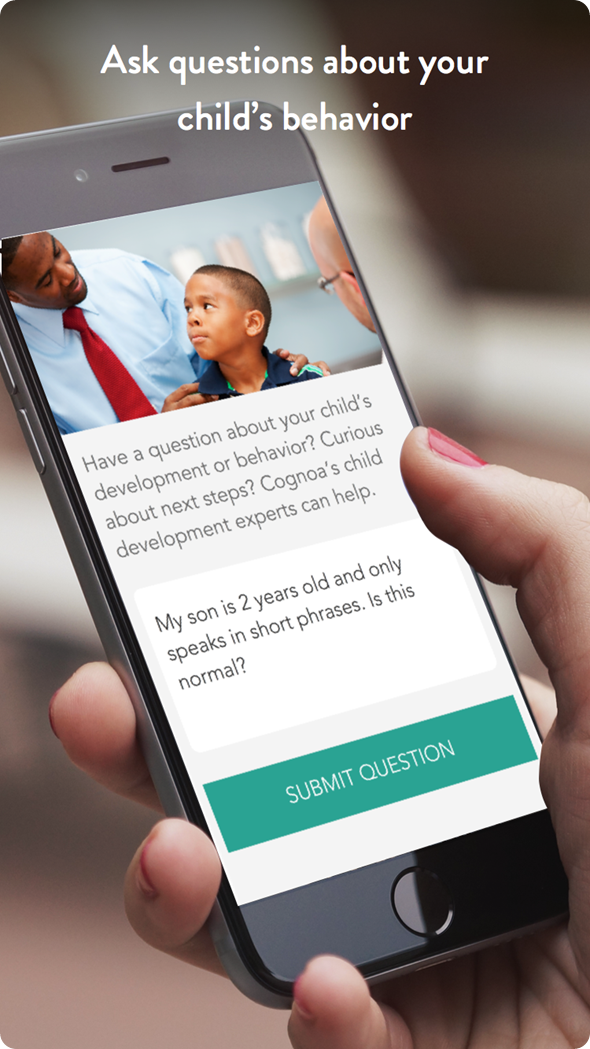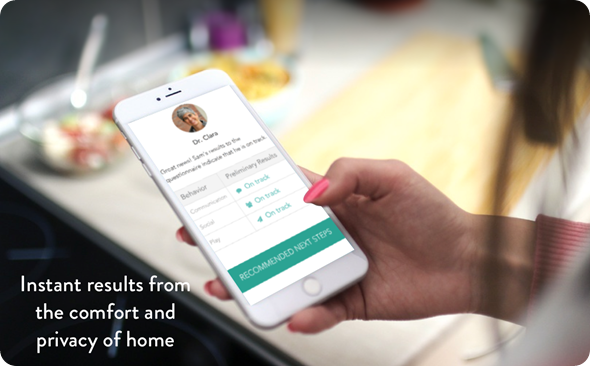Cognoa's app helps every parent find out if their child’s development is on track and, if not, get their child the right help as early as possible.
The effectiveness of early intervention has been demonstrated in numerous studies, but many parents lose the most valuable time while waiting up to two years for a diagnosis.
With Cognoa, a parent answers simple questions and uploads two short videos of their child's behavior; Cognoa’s app then determines whether the child is at risk for developmental delay or autism using machine learning algorithms developed at Harvard and Stanford Medical Schools.
Cognoa provides a personalized report parents can share with their doctor that identifies specific areas where the child is doing well, in addition to areas where the child might need early or rapid intervention.
Cognoa can also provide personalized next steps that integrate on-going monitoring.
How does Cognoa help parents detect developmental delays?
Cognoa offers a simple, easy-to-use consumer app that parents can use from the comfort and privacy of their own home. They can provide information about their child by answering a few questions and uploading short videos of their child’s natural behavior.

Cognoa’s assessment provides the parent and the clinician with a risk assessment for developmental delay including in-depth information about the most concerning behaviors identified prior to the child's first visit.
What are the main signs of developmental delays and how many children are affected?
One in six children in the U.S. has some form of development delay. The Centers for Disease Control has determined that the average age a parent notices the signs and symptoms of developmental delay is often as young as 12 months, but they are not diagnosed until three or four.
Children who consistently miss milestones in key areas of development (social, emotional, physical, cognitive, language) may be at risk for a developmental delay, including autism.
If you notice that your child doesn’t crawl, doesn’t search for things that she sees you hide, doesn’t babble or use single words such as mama or dada, doesn’t use gestures like waving bye-bye, doesn’t point to things, or has lost skills that they once had, you should discuss this with your pediatrician.
Can you please explain the science behind the Cognoa assessment?
Our machine learning scoring system has been validated using several large archival repositories containing data on over 10,000 families with different types of developmental delay and/or autism spectrum disorder.
The scoring system has also been validated in a prospective clinical validation study, with two additional multi-site studies underway.
The sensitivity and specificity values for the system currently range from 90-97% and 80-94% respectively.
Cognoa is also developing a method and platform to use the specific behavior output of Cognoa’s scoring system to provide personalized therapy and intervention programs that parents can use at home, which includes effectiveness monitoring of the child’s progress.
How much research and validation studies have been carried out on Cognoa?
Although Cognoa continues to advance the research and validation of its machine learning approach in prospective studies with clinicians, one of the most exciting things we are doing is crowd-sourcing the largest outcome study of child behavioral development.
Cognoa recently began enabling its member parents to update their children’s profiles with the diagnoses they receive from their doctors.
We have already received the information from over 3,000 parents and are now reaching out to more of our 100,000 registered users to collect ongoing data.
The diagnoses we have obtained continue to validate that our free assessment is sensitive to the broader spectrum of developmental delays including Speech and Language Delay, ADD, ADHD, and autism.
The early science that powers Cognoa was generated by Dennis Wall, PhD and his team at Harvard Medical School. They developed the basis for the Cognoa assessment by using machine learning approaches to detect meaningful patterns in large data sets.
They used it to hone in on specific behaviors from the standard diagnostic instruments (ADOS, ADI-R and others) that have the highest value for detection of children at risk for developmental delay and autism.
The results provided the basis for a predictive algorithm that relies on behavioral reports from parents coupled with an evaluation of short (< 5 minute) home videos of the child in a comfortable and natural setting.
Dr. Wall’s team developed simple instructions that non-clinicians could use to evaluate and correctly score the home videos and has demonstrated the reproducibility of this scoring methodology. Clinical validation of the questionnaire and screening tools are ongoing with collaborating clinical centers across the nation.
Dr. Wall has published several papers in peer-reviewed open-source journals that can be reviewed at the following links:
- Duda M, Kosmicki JA, Wall DP (2014). Testing the accuracy of an observation-based classifier for rapid detection of autism risk. PubMed Central PMCID: PMC4150240.
- Fusaro VA, Daniels J, Duda M, Deluca TF, D'Angelo O, Tamburello J, Maniscalco J, Wall DP (2014). The Potential of Accelerating Early Detection of Autism through Content Analysis of YouTube Videos. PLoS One. 16;9(4):e93533.
- Kosmicki JA, Sochat V, Duda M, Wall DP (2014). Searching for a minimal set of behaviors for autism detection through feature selection-based machine learning.PubMed PMID: 25710120.
- Wall DP, Dally R, Luyster R, Jung JY, Deluca TF (2012). Use of artificial intelligence to shorten the behavioral diagnosis of autism. PLoS One. 7(8):e43855.
- Wall DP, Kosmicki J, Deluca TF, Harstad E, Fusaro VA (2012). Use of machine learning to shorten observation-based screening and diagnosis of autism. Transl Psychiatry. Apr 10;2:e100.
In what ways is Cognoa currently limited?
Cognoa’s data and machine learning models support identifying the majority of children who might be at risk for a general developmental delay between the ages of 24 months and five years. We are working with our data scientists to build the data sets and validate our data models to drive that age down to 12 months.
Cognoa is also very good at reaching any parent who has a mobile phone which is great for addressing healthcare disparities with lower income and non-US users. Roughly 25% of our parent users are outside the US, but our app is currently only available in English.
What types of advice does Cognoa give parents in terms of helping their child improve?
Cognoa creates a personalized assessment that highlights a child’s strengths and areas of concern based on information and short videos the parents provide of the child’s natural behavior.
-350-1.jpg)
When parents share their results with their doctor, they appreciate that their doctor can get a glimpse of the child’s behavior outside the doctor’s office.
Once parents complete Cognoa’s assessment, they can join our Parent Groups, a network of other parents who share the same concerns or are working on the same developmental challenges with their children.
These Parent Groups include parents who are working on such issues as sleep, potty training, tantrums, restless behavior and other developmental issues.
Parents are able to view their Groups from the dashboard and are also given the opportunity to ask questions of Cognoa’s experts. They can come back and view their Group feeds which lists questions from parents like them answered by experts.
What feedback have you had on Cognoa so far?
We have had great feedback from parents by helping them answer important questions about their children from the comfort and privacy of their own homes.
The most common feedback we have heard from our 100,000 parent members is that Cognoa gives them peace of mind.
Since we launched our Parent Groups to allow our parent members to learn from and connect with thousands of parents who share the same concerns, one of our most common pieces of feedback has been, “Thank you for helping me know that I am not alone.” Here are some direct quotations from our members.
I believe this is a great resource to help parents track their child's relative development and gain support from other parents with similar experiences.”
“Using Cognoa helped me get a jump start on my son’s autism diagnosis. I've actually already had a friend use this service after my recommendation.”
"I have been working with early intervention with my son and the areas of concern Cognoa suggested are the areas we work on with early intervention. You were spot on by just sending videos to be that correct I was highly impressed and pleased. Thank you Cognoa."
"Results were very quick. Helpful in helping to come up with a treatment plan."
“Thank you for the peace of mind and thank you for not being quick to [see a problem] where there is not one!”
“I was concerned with my son’s hand movements, behaviors, sleep patterns and constant interruptions. But I am happy to find he is low risk.”
“You gave me ideas on how to help my child and offered groups I can chat with on his different issues.”
“With Cognoa we were able to get in sooner to get our son evaluated. Previously they had told us 6 to 7 months.”
What impact do you think Cognoa will have on screening for developmental delays?
Cognoa screens over 10,000 new children a month and will quickly become the largest screener of all children to identify developmental delays earlier, when parents and doctors can do the most to help.
The machine learning algorithms that operate under the hood allow our parents to start getting answers immediately from the comfort and privacy of their own home. Our goal is to drive down the age of diagnosis for most developmental delays to 12-24 months and do so in an evidence-based way.

We want Cognoa to be part of screening all children at 18, 24, and 30 months and tracking their development to show every parent and clinician what works best to maximize development for their child.
Our goal is to have all pediatricians see Cognoa as the trusted screener and all parents feel that Cognoa’s tools provide some peace of mind when it comes to their children.
What do you think the future holds for the testing of developmental delays in children?
The literature has shown that the best predictor of outcome is the age when a parent had a first concern, typically around 12 or 18 months. Yet, children aren’t being evaluated until they’re much older.
Pediatricians have little time during an office visit to routinely screen children as much as they should and often don’t have the confidence in the screening tools themselves to confidently make a referral.
Cognoa improves efficiency by having the parent do much of the work on the front-end. By sharing results electronically with their doctors, they can spend time during the office visit going over the reports and focusing on the red flags.
There is a big push to use technology to make behavioral screeners more accessible. Cognoa is a pioneer in this area and is using technology not just to make screeners more accessible but to fundamentally improve how we screen all children.
As Cognoa builds the world’s largest data set of child behavioral and outcome data, we will be able to offer every parent answers to their questions and suggestions to enhance their child’s development based upon tens of millions of data points from millions of parents like them.
Where can readers find more information?
Readers can visit https://www.cognoa.com/ or search “Cognoa” in both the iOS App Store and Google Play Store.
About Dr Clara Lajonchere
Dr. Clara Lajonchere is Chief Science Officer of Cognoa. She is both an academic researcher and leading expert on autism spectrum disorders who has worked in the field of psychiatric genetics for over 25 years.
Clara joined Cognoa after eleven years as VP of Clinical Programs at Autism Speaks, where she developed a portfolio of evidence-based programs for clinical research.
She is interested in developing innovative technology for early identification of developmental concerns and improving access to quality care for families in need.
She is also experienced in developing best practices for comprehensive medical care, community engagement of underserved populations, clinical trial design, development of national patient registries, and conceptualization of large-scale informatics and genomics initiatives.
She has held appointments at USC in Biomedical Engineering and in Pediatrics.